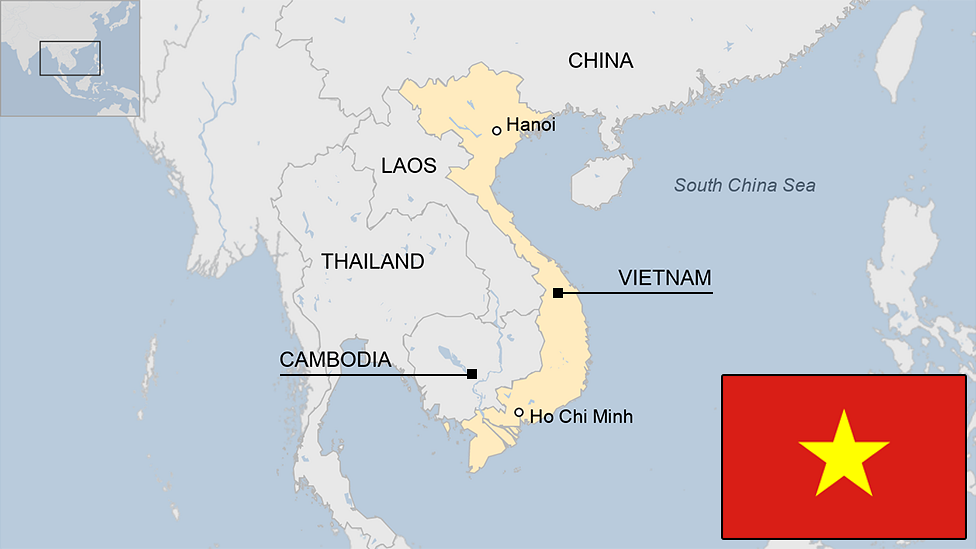Why do Vietnam's patients bribe their doctors?
- Published
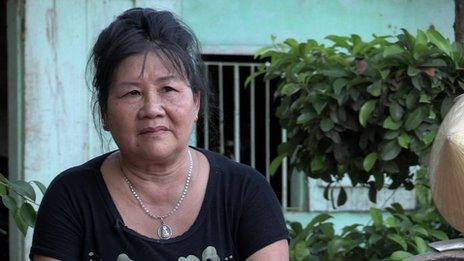
Mrs Phin handed over an envelope after her eye treatment in hospital
Three months ago, a woman from a village south of Hanoi needed her son referred to a provincial hospital by a district doctor for an operation.
Handing over an envelope containing 50,000 Vietnamese dong (VND) ($2.4, £1.6) did not do the trick, but when she added another 50,000 VND, the referral was secured.
The 33-year-old woman, who did not want to be identified, then gave an envelope containing 500,000 VND ($24, £16) to the medical staff at the provincial hospital, an amount that was more than two months of her income.
"All other patients told me that everyone must give envelopes to thank the doctors and nurses for the treatment, and that was the rate for such an operation," she said.
The staff did not ask for it but she believed that by giving the envelope her son would receive better care.
She is not alone. Mrs Phin, a pensioner from a Hanoi suburb who lives on 3m VND per month, handed over an envelope containing 200,000 VND after eye treatment in hospital.
But she was sent home before the treatment was complete. So she was admitted to hospital again and that meant another thank-you envelope.
"It cost me another 200,000 VND to thank the doctors and nurses. I could only afford the smallest amount suggested by other patients," she said.
Mrs Luyen, a retired teacher from a small town 35km outside of Hanoi, said passing over a cash gift for medical treatment was effectively mandatory.
"Not all doctors ask for the envelopes but giving envelopes is a must when you go to hospital. It's in our culture," she said.
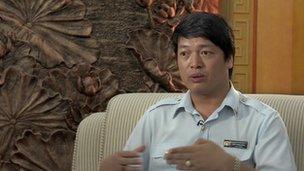
Ngo Manh Hung said changing behaviour will take time
'Material not spiritual'
In Vietnam, medical treatment is mostly subsidised by the state via an insurance system free to civil servants and children, or paid for privately or by employers.
But queues for treatment under insurance cover are long and public hospitals overcrowded, while salaries for much of the medical profession remain low.
And with growing capitalist sentiment meeting entrenched Confucian values, the practice of handing over a cash-filled envelope to secure faster or better service has become widespread.
The number of people who gave envelopes doubled in the three years from 2007-2010 - from 13% to 29%, one study showed.
In 2012, a survey published by the World Bank and Vietnam's Government Inspectorate (which runs the Anti-Corruption Bureau) showed that 76% of those who had paid a bribe to health service personnel did so voluntarily, with only 21% responding to a request.
In an effort to fight corruption, five big hospitals in Hanoi launched a campaign in October 2011 to bolster ethical behaviour among staff, including a "Say no to envelopes" policy.
Vietnam's Research and Training Centre for Community Development (RTCCD) also conducted a similar campaign to change perceptions of informal payments, using the media to raise patients' awareness of their rights as well as of doctors' duties.
Nguyen Huu Ngoc, a well-known scholar in Hanoi, said the root of the problem lay in the Confucian gift-giving tradition.
"In Vietnamese society as well as in Chinese, gifts stem from gratitude," the scholar said.
"Showing gratitude used to have more spiritual value than material value. But over the years, it has become more material and less spiritual, and now in the market economy it is like a transaction."
Culture might be used to justify the payments - but culture can be changed, according to Soren Davidsen, a senior governance specialist at the World Bank in Hanoi.
"We know gift-giving is an important part of culture. But we also know that culture is not a static but dynamic thing. Several countries in East Asia, such as Singapore, South Korea and Japan, have a culture of corruption, yet these countries have found effective ways to curb corruption.
"Although there is often the perception about culture being a part of corruption, we think that this is the wrong way of looking at it. And we can, by involving people, businesses and government in partnership, actually change culture," said Mr Davidsen.
'Money and power'
For many people, the line between a gift and a bribe has become blurred - something some people embrace as "an excuse to give envelopes", said Tran Thu Ha, vice-director of RTCCD.
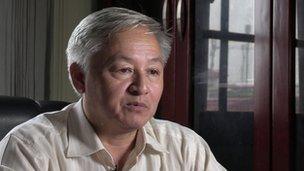
Ta Van Binh said the government needs tougher rules
But for people who campaign to stop the practice like her, it is easy to identify what is a gift and what is a bribe.
"A gift can be given in public or anywhere, it needs time to talk and to say thank you, whereas a bribe is often given very quickly and both the giver and the receiver are afraid of being seen by other people," Ms Ha said.
But to change people's behaviour is one of the big difficulties that Vietnam is facing and will take time, acknowledged Mr Ngo Manh Hung, deputy director-general of Vietnam's Anti-Corruption Bureau.
There has been considerable debate about how to curb the practice in the health service. One suggestion is raising health workers' salaries so that they stop accepting envelopes.
But that alone will not be enough. Associate Professor Ta Van Binh, director of the National Institute of Diabetes and Metabolic Disorders, believes that the government needs clear rules and tough punishments for medical staff who break them.
But work also needs to be done to help patients understand that they do not need to give envelopes - and may themselves be breaking the rules if they do.
Nguyen Huu Ngoc even thinks that there should be sanctions applied to patients who give envelopes to help clean up the industry.
But this would need co-operation from all sides - patients, health workers and the authorities - and remains a big task.
"It's not an easy thing to do because corruption is about money, people and power," said Mr Davidsen of the World Bank.
"It's a huge challenge curbing corruption and co-ordinating anti-corruption efforts across government agencies. It is not a quick fix and can't be done overnight."
There will be a series of special reports and articles this week as the BBC examines why bribes and backhanders are part of the system in so much of the world, looks at countries which have tried to roll back the tide - and explains how corruption works.
- Published9 July 2013
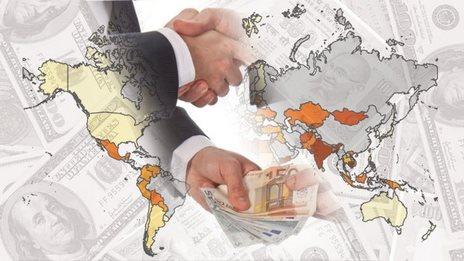
- Published23 October 2024
